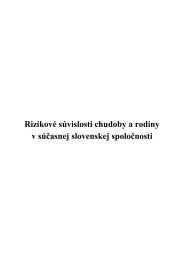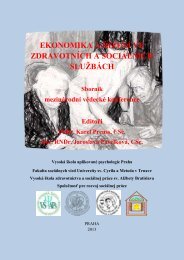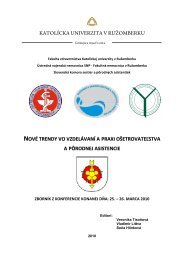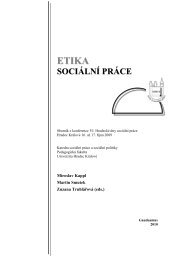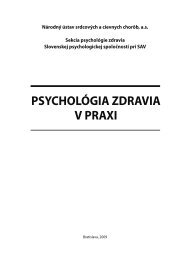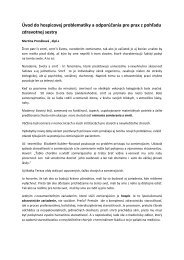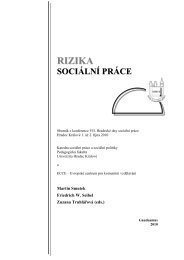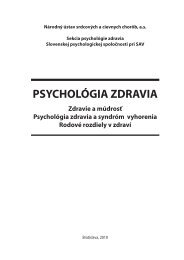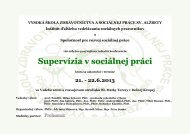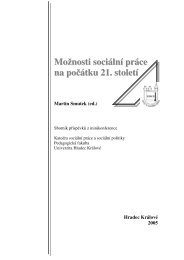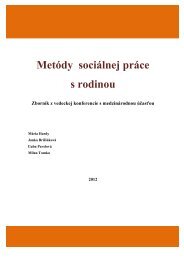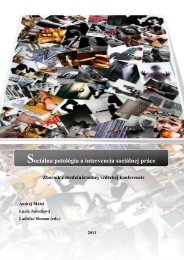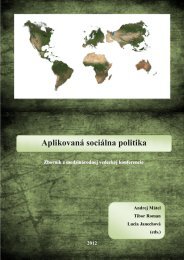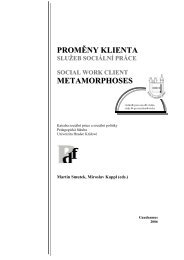Zmena klÃmy â možný dopad (nielen) na obyvateľstvo - Prohuman
Zmena klÃmy â možný dopad (nielen) na obyvateľstvo - Prohuman
Zmena klÃmy â možný dopad (nielen) na obyvateľstvo - Prohuman
You also want an ePaper? Increase the reach of your titles
YUMPU automatically turns print PDFs into web optimized ePapers that Google loves.
that help people mitigate or adapt to climate change, such as reducing greenhouse<br />
gas emissions and developing new agriculture techniques, could bolster the<br />
fight against HIV. But for that to happen, policymakers have to understand that<br />
there is a problem and properly deploy resources as sea levels rise, deserts creep<br />
in and humanity moves. Drought doesn‘t necessarily mean famine, and it doesn‘t<br />
necessarily mean HIV.<br />
HIV/AIDS and Environmental Health Initiatives<br />
Awareness of counselling and prevention of HIV/AIDS, including environment<br />
health programmes to combat opportunistic diseases that are associated with<br />
HIV/AIDS such as Malaria, TB, Cholera, Bilharzias, and STIs, have been initiated<br />
at local government and donor supported projects. Such initiatives include the<br />
Pangani Hydropower Project – PULIS – Initiatives which has been conducting<br />
community awareness campaigns, lobbying and advocacy, research and training<br />
through involvement of Village Health Workers (VHW) and Traditio<strong>na</strong>l Birth Attendants<br />
(TBS). Other interventions have included improved environmental sanitation<br />
for combating STIs, HIV/AIDS and other opportunistic diseases through<br />
construction of the latrines, voluntary testing for HIV, improved mater<strong>na</strong>l health<br />
care, improving access to bed nets and condoms. Bottom up approaches applying<br />
participatory community techniques are also used.<br />
East African Community (EAC) has set up health, environment and <strong>na</strong>tural resources<br />
as independent sectors within the Directorate of Productive and Social<br />
Sectors. Under health HIV/AIDS and Gender have been mainstreamed into all<br />
EAC Regio<strong>na</strong>l level policies, strategies, projects and programmes in all EAC organs<br />
and institutions. Sustai<strong>na</strong>ble environment ma<strong>na</strong>gement and economic utilization<br />
of <strong>na</strong>tural resources has been established. This includes promotion of sustai<strong>na</strong>ble<br />
use and ma<strong>na</strong>gement of <strong>na</strong>tural resources in order to conserve the environment.<br />
Some studies noted that a safe and friendly environment is important for home<br />
based care givers of non-hospitalised HIV/AIDS patients. They resolved that closely<br />
working together both the environment and HIV/AIDS village committees had<br />
a lot in common and could kill lots of birds with one stone. That is that when setting<br />
local by-laws they could do so to encompass both environment and HIV/AIDS.<br />
They realized that their livelihood activities had an effect on the environment and<br />
consequently on health, including HIV/AIDS. For example, while gatherings and<br />
camps for seaso<strong>na</strong>l fishing and traditio<strong>na</strong>l initiations could cause food insecurity,<br />
littering and poor sanitation could also lead to HIV/AIDS. Sited examples<br />
48



